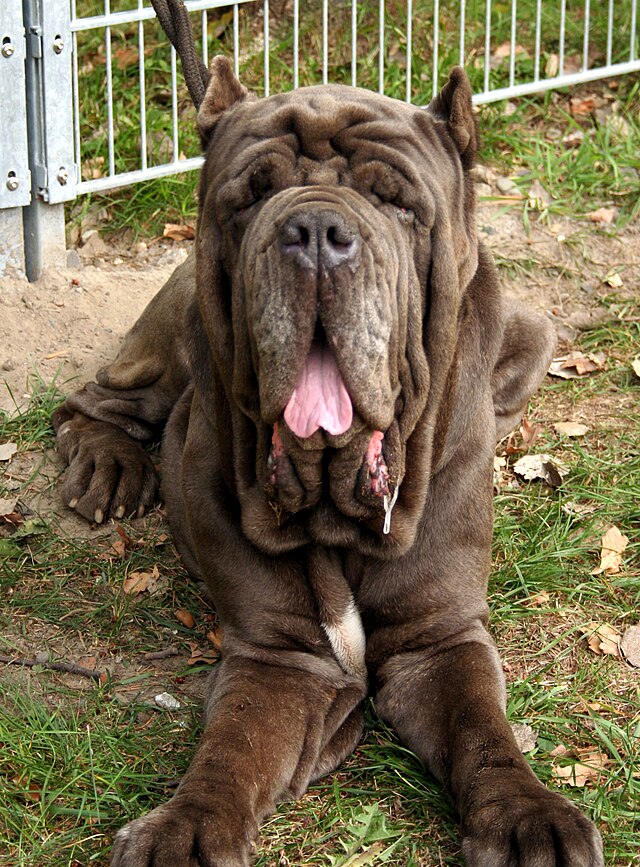


The Neapolitan Mastiff, also known as the "Mastino Napoletano," is a large and powerful breed originally from Italy. Known for their massive size, loose skin, and distinctive wrinkles, these dogs are a sight to behold. Despite their intimidating appearance, Neapolitan Mastiffs are known for their gentle and protective nature. They are loyal, devoted companions, often forming close bonds with their families. Due to their protective instincts, they make excellent guard dogs. However, their massive size and strength require an experienced owner who can properly manage and care for them.
The Neapolitan Mastiff has a long history dating back to ancient times. It is believed that the breed descends from large Molossian dogs used by the Romans for guarding and protecting. The breed's development in Italy likely began in the region around Naples, where it was used for guarding properties, livestock, and people. Over the centuries, the Neapolitan Mastiff has been employed as a war dog, guard dog, and hunting dog. The breed nearly faced extinction after World War II but was revived thanks to the efforts of breeders who wanted to preserve its unique characteristics. Today, the Neapolitan Mastiff is still highly regarded as a guard dog and family companion, prized for its loyalty and protective instincts.
The Neapolitan Mastiff is a giant dog, with males standing between 26 to 31 inches at the shoulder and weighing 110 to 150 pounds, while females are slightly smaller. They have a very muscular, robust build with a large, broad head and a strong, deep chest. Their most distinctive feature is their loose, wrinkled skin, especially around the head, neck, and shoulders. The coat is short, dense, and smooth, and can come in various colors, including black, blue, mahogany, and tawny. Despite their impressive size, Neapolitan Mastiffs are surprisingly agile and can move quickly when necessary. Their large, square-shaped body and powerful frame give them a formidable presence. Their ears are typically cropped, but natural ears are large and floppy. Their tail is thick at the base and tapers toward the tip.
Neapolitan Mastiffs are known for their calm and gentle temperament, particularly with their families. They are incredibly loyal and protective, often forming a strong bond with their owners. While they can be aloof or wary of strangers, they are generally not aggressive unless provoked. Neapolitan Mastiffs are often very good with children, especially if raised with them, and they are known to be affectionate with their family members. Despite their intimidating appearance, they are not typically aggressive dogs but are naturally protective and will defend their family if necessary. Early socialization is important to ensure that they grow up to be well-rounded, well-behaved dogs. However, due to their size and protective instincts, they may not be the best choice for first-time dog owners.
The Neapolitan Mastiff is not a highly energetic breed but still requires regular exercise to maintain a healthy weight and prevent boredom. Their exercise needs are moderate, with daily walks and some playtime being sufficient to meet their physical activity requirements. While they enjoy being outdoors, they do not require intense exercise like some other breeds. However, they can benefit from mental stimulation through training, socialization, and interactive play. Due to their large size, it's important to avoid excessive exercise in hot weather, as they are prone to overheating. Neapolitan Mastiffs are more suited to a calm, relaxed lifestyle, making them ideal for owners with a moderate activity level. Despite their laid-back nature, they should never be completely sedentary to avoid health problems associated with obesity and muscle weakness.
Neapolitan Mastiffs are intelligent but can be independent and somewhat stubborn, making training a bit challenging for first-time dog owners. They respond best to firm, consistent, and positive reinforcement-based training. Due to their protective nature, early socialization is crucial to ensure that they are comfortable around strangers, other animals, and different environments. Socialization helps prevent aggressive tendencies and allows the dog to differentiate between real threats and normal situations. It's important to train them from an early age, as their large size and strength can make them difficult to handle if not properly trained. Obedience training and positive reinforcement will help them become well-mannered companions. Patience, consistency, and socialization are key when training a Neapolitan Mastiff.
The Neapolitan Mastiff is generally a healthy breed, but due to its large size, it is prone to certain health issues. Common health concerns include hip dysplasia, elbow dysplasia, bloat (gastric torsion), and entropion (a condition where the eyelids roll inward). Regular veterinary check-ups, a balanced diet, and proper weight management are important to ensure their health and prevent obesity-related problems. Their short coat is relatively easy to maintain but requires regular cleaning of their skin folds and wrinkles to prevent infections. Their ears and eyes should also be cleaned regularly to avoid infections. Neapolitan Mastiffs may be sensitive to heat due to their large bodies and thick skin, so it's important to avoid overexertion during hot weather. Regular exercise, good nutrition, and routine veterinary care will help them live a long, healthy life.
The average lifespan of a Neapolitan Mastiff is between 7 to 9 years. Like other large breeds, they have a shorter lifespan compared to smaller dog breeds. However, with proper care, including a healthy diet, regular exercise, and routine veterinary visits, they can live relatively long and fulfilling lives. As they age, it's important to monitor them for common health issues, such as joint problems and vision changes, which can affect their mobility and comfort. Neapolitan Mastiffs thrive in a calm environment, and with good care, they remain loyal, affectionate companions throughout their lives.
© copyright Dog Compendium 2024 - 2026